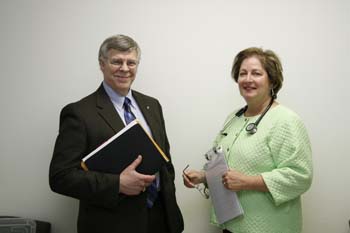| Back to Back Issues Page |
 |
|
VBPM Connection, Issue #024 -- News from your doctor's office. August 01, 2012 |
The Virginia Beach Premier Medical NewsletterAugust, 2012
VBPM Connection is a newsletter published by Virginia Beach Premier Medical, an internal medicine practice dedicated to personalized, highly attentive, high quality care for our patients. The newsletter provides information of a general nature about our office, current health news and various common illnesses and ailments. None of the information provided is meant to be specific for any particular individual. Always seek the advice of your personal physician for any specific information about your health. If you would like to receive a copy of this free monthly newsletter electronically by email, go to the Newsletter Signup Page on the office website (www.vbpm1.com) and enter your email address in the signup box.
If you have a topic that you would like to see appear in the newsletter, please let us know at gjwarth@gmail.com. Ask questions. Change your appointment. Get your lab or x-ray results. Request prescription refills. Keep us informed. Join Twistle, a secure communication network.
Vitamin D Prevents Fractures
A recent study verifies that those older adults (over 65) who take vitamin D supplements, even without taking calcium along with it, have a significantly lower risk of fractures.
The minimum effective dose is 800 units per day. If you're taking a multivitamin, you're only getting 400 units from that. You will need an additional 400 units of Vitamin D for it to do any good - even more if your vitamin D level is low in your lab work. This is good news, since there is currently a push away from taking calcium supplements due to their risk of vascular problems and kidney stones. High amounts of dietary calcium is not a problem - only the calcium supplements, or tablets. So, make sure you're getting enough vitamin D. This goes for both men and women over the age of 65. If you're not sure about how much to take, ask your doctor. Why have an increased risk of fracture if you can prevent it?
How Much Alcohol Is Too Much?
Overuse of alcohol is a medical problem that can result in a considerable amount of toxicity, both mentally and physically. How much can a person drink before it's considered "overuse"?
Here's the guide: For women, the maximum amount of alcohol should be no more than 3 standard alcoholic beverages on one occasion, and no more than 7 drinks per week. For men younger than 65, the amount should be no more than 4 drinks on any one occasion, and no more than 13 per week. For men over 65, follow the same recommendations for women. Any use of alcohol by children, teens, women who are pregnant or breast feeding, by those with a personal history or even a family history of alcohol dependence and by anyone engaging in any situation requiring attention or skill, such as driving, operating power tools, machinery, boats, etc, should all be considered hazardous to the health of that person and those around them. Drinking alcohol in excess of the above recommendations over time will cause serious liver disease, hypertension, heart disease, dementia, pancreatic disease, diabetes, major bleeding disorders, gastritis, ulcers, and various types of cancer too numerous to mention - any and all of which can lead to a very early death. Mentally, it causes depression, agitation, psychosis, confusion, irritability, guilt feelings, alienation of family and friends and complete disruption of life, career and overall health. I have known many good, wonderful people who died in their forties because of this devastating disease. It's a slippery slope, because most people who drink excessively are in denial about it and are often annoyed by people who are concerned about their drinking. They eventually become guilty about it, start hiding it from others, and ultimately find that they can't stop shaking without it. If you are concerned about your drinking or if your family is concerned, talk about it with your doctor. Treatment is available and often effective for those who are willing to recognize that it's a problem, and who are willing to get help.
HealthCare Reform
This article appeared in our Medical Blog on the website (www.vbpm1.com) recently. I thought it was worth repeating here...
How much do you really know about the Patient Protection and Affordable Care Act? First, take the health reform quiz at the Kaiser Family Foundation site (http://healthreform.kff.org/quizzes/health-reform-quiz.aspx).
Then check out the July 7, 2012 blog entry on the Art of Patient Care website for links to some factual information about it. Art of Patient Care Blog (http://www.art-of-patient-care.com/patient-care-blog.html) Or, go to the following websites... American College of Physicians
Zithromax for Chronic Use
A recent article appearing in the New England Journal of Medicine reviews the evidence and advocates the use of azithromycin (Zithromax), in a low dose on a chronic basis for those patients with COPD (Chronic Obstructive Pulmonary Disease) who have recurrent frequent exacerbations of bronchitis with wheezing that often will require frequent hospitalizations. Chronic daily use of this drug seems to reduce the frequency and severity of these recurrences. Azithromycin has some anti-inflammatory properties as well as being an antibiotic that seems to improve recovery rates significantly more than some other antibiotics in these situations. There are some hazards to its use, however, and must be used with caution in patients with severe liver disease or cardiovascular disease, or in those patients who have to take a statin for cholesterol-lowering.
Environmental Estimates
It has been estimated that if we put a tax on sodium, such that it reduced sodium (salt) intake by 6%, it would reduce heart disease and stroke to such an extent that 1.3 million life-years could be saved and 22.4 billion dollars in healthcare could be saved over the lifetime of adults between the ages of 40-85.
Anti-smoking initiatives in New York City are estimated to have reduced the number of smoke-related deaths by 1500 per year.
Heat Stroke
Thermometers have been rising to record levels in many parts of the country recently. This often results in problems with heat stroke, a medical emergency defined as body temperature greater than 40 degrees Centigrade (104 degrees Fahrenheit) associated with confusion or other neurological symptoms in the setting of high environmental temperature. Other complications can include acute respiratory distress syndrome, acute kidney injury, liver failure, bleeding disorders, seizures, myositis (muscle inflammation), not to mention severe dehydration. Mortality rates for severe episodes of this can be quite high.
The syndrome often occurs during summer months, particularly during long heat waves, in older individuals who live in apartments with no air conditioning, and who often don't drink enough water. The situation is even worse when the humidity is greater than 75%, because evaporation of perspiration (one of the best cooling mechanisms the body has) isn't working at that point. The emergency treatment requires rapid cooling, protection of airway, breathing and circulation. Rapid cooling is usually done by spraying the body with lukewarm water while using fans to enhance evaporation. Special cooling blankets can be used as well. Shivering can be controlled by using intravenous medicines like Ativan or Valium. Other complications like kidney failure, dehydration or respiratory failure have to be treated as well.
Shoulder Pain
The acute onset of shoulder pain is a common presenting symptom and is usually caused by one of the following problems:
~ Rotator cuff tendinitis - Lateral shoulder pain aggravated by reaching, raising your arm overhead or lying on your side. ~ Rotator cuff tear - Weakness of shoulder muscles, loss of function, unable to raise arm above 90 degrees. ~ Bicipital tendinitis - Anterior shoulder pain occurring mostly with lifting, flexing, overhead reaching. ~ Acromioclavicular syndromes (like AC separation) - Anterior shoulder pain and deformity, usually caused by trauma or overuse ~ Glenohumeral arthritis - gradual onset of anterior pain and stiffness, decreased range of motion, crepitation (grinding or cracking sensations when moving the joint). Treatment is directed toward the specific cause, but often initially requires some period of rest followed by physical therapy for 4 weeks. Sometimes cortisone injections given locally are helpful along with use of local or oral NSAIDs (anti-inflammatory medicines).
Bipolar Disorder
Previously called manic-depressive disorder, bipolar disorder falls into 2 general categories with lots of overlap. Type 1 features multiple manic episodes with intermittent bouts of depression. Type 2 is characterized mostly by major depression with a history of at least one hypomanic episode. This condition is frequently misdiagnosed. It occurs in about 1-4% of the population. There is a strong genetic component.
Manic or hypomanic episodes are those in which the individual usually feels really good, has lots of energy, loses sleep but doesn't mind it, and often gets into trouble because of impaired judgment. May go on shopping sprees and spend too much money, may become much more vocal than usual that can get the person into trouble, may become very irritable, much less reserved than usual, lacking normal inhibitions, and in general is acting out of character, not like s/he usually acts. The mood may then swing into a severely depressed mode for a while and then become manic again. Of course, like so many other things in medicine, the presentation is not always that typical or classic and often requires a psychiatrist to make an accurate diagnosis. Treatment is more complicated than it is for simple depression which is why those with this disorder are often referred to psychiatrists who have good knowledge of pharmacotherapy. Many different medicines have been used to treat this disorder, some of which can have significant side effects and require close monitoring.
ADHD
Another condition that is also frequently misdiagnosed is Attention Deficit/ Hyperactivity Disorder. This is a syndrome of having great difficulty paying attention or concentrating, abnormal impulsivity, along with motor restlessness and hyperactivity. It usually starts before the age of 7 years old.
Before a person is diagnosed with this problem, there must be some functional impairment caused by the above symptoms, such as difficulty in social, academic or occupational functioning. There also needs to be a problem in at least 2 different environments, like at home and at work or school. It does run in families. Sometimes adults suddenly realize they have had this tendency after their children have been diagnosed with it. Treatment can involve either stimulants or antidepressants or both. Behavioral therapy may also be helpful and can reduce the amount of medication required. There is a tendency for many people even without ADHD to want to take stimulants because they do provide some energy, so there is a high level of abuse which is why it is an FDA-controlled substance. There is a price to pay for using these substances indiscriminately because they can cause hypertension and cardiac arrhythmias and are potentially dangerous.
Telemedicine
This is a rapidly developing area in which medical information is being passed via telephone or by video-conferencing usually in the setting of using those technologies to provide clinical care to a patient or patients.
It has been used locally in intensive care settings in which the physician can be advised about the condition of a patient using video equipment in the patient's room that will show images to the doctor in his home or office. The patient can be viewed along with current lab work, x-rays and cardiac monitoring information. The three main types of telemedicine include (1) storing and then forwarding the information such as labs and x-rays to the physician later, (2) remote monitoring, which can provide a continuous flow of EKG monitoring, for example, to the physician's office, or (3) real-time interactive patient "visits", where there is discussion between the patient and the physician via the communication/conferencing equipment. It's hard to know exactly where this technology will lead us, and there certainly are pros and cons to its use. It has the danger of further eroding the already straining doctor-patient relationships that were once felt to be essential in the practice of clinical medicine. Hopefully, it will ultimately take its place as a useful tool but will not supplant the personal bedside or office visit as the primary means of providing care.
About Our Office
Virginia Beach Premier Medical is a membership internal medicine practice specializing in comprehensive and compassionate, individualized and personalized patient-centered care. We pride ourselves on full continuity of care – in the office, in the hospital, or even at home.
Compassion
The compassion that health care providers have toward their patients is an intangible part of clinical medical care that cannot and should not ever be replaced by machines or computers. Cook-book computerized medicine may work alright for certain things like simple colds or upper respiratory infections, but for anything more than that, loss of the human element in taking care of patients would be very sad indeed. Lack of humanity, compassion, concern and empathy in caring for a patient whose life is at stake is inhuman and inhumane. I am hopeful that we never get to the point of having to argue about that politically, or to save money, because it should be a self-evident truth and a human right.
At VBPM, you will never find lack of compassion or concern. Those things are inherent within the fabric of all of those who work here. Your worries are our worries, and we will do everything we can to help you with them.
If you would like more information about our practice please call us at 757-416-6750 or visit our website at www.vbpm1.com. Ask to speak with Brittany, our office manager, or Dr. Parks or Dr. Warth. We’d be happy to talk with you anytime.
Enjoy Your Summer!!!
|
| Back to Back Issues Page |




